
Sara Jayne Steen
2006-2015
Sara Jayne Steen, president emerita of Plymouth State University, served nine years as president, from 30 June 2006 to 30 June 2015.
During President Steen’s tenure, the campus created strong academic programs and facilities, reshaping the campus’s living and learning environment; expanded PSU’s academic profile and reputation, with new and focused initiatives; increased PSU’s global presence and expanded innovation in sustainability; and emphasized making central and northern New Hampshire stronger through partnership and community engagement.
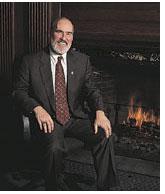
Donald P. Wharton
1993-2006
Donald P. Wharton served as the president of Plymouth State University from 1993 to 2006. During his tenure, Plymouth State University implemented higher admission standards which resulted in significant improvement in student academic and civic performance. The graduate programs at Plymouth State experienced substantial growth with new course offerings and professional development partnerships with school districts around the state. The University’s advancement effort included the launch of a $5 million capital campaign, the first part of which coincided with the completion of Boyd Science Center. Plymouth’s physical campus changed dramatically with a new student union building, a new library, and major renovation and conversion of the Draper & Maynard building to support the Department of Art and the Health and Human Performance Department. Additional improvements included a new co-generation plant for electricity and heat for the campus, the demolition of the old power plant and associated buildings to create more green space, and the conversion of town streets to campus walkways.
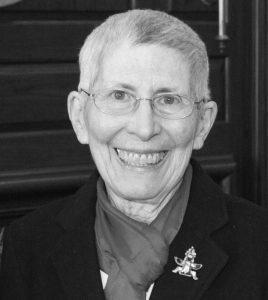
1992-1993
Theodora J. Kalikow served as interim president of Plymouth State from July 1992 until June 1993 before becoming president of the University of Maine at Farmington. During her governance she raised Plymouth State’s academic standards, strengthened student advising, improved retention and graduation rates for students, and expanded the assessment of student outcomes and development for faculty. She also heightened the college community’s sensitivity to women’s issues. As a result, an annual award commending the work of a Plymouth State faculty or staff member on behalf of women and awareness of women’s issues was named in her honor.
Kalikow is a graduate of Wellesley College and earned her Master’s degree in philosophy at Massachusetts Institute of Technology and her Ph.D. in philosophy at Boston University. Prior to her service at Plymouth State, Kalikow was dean of the College of Arts and Sciences at the University of Northern Colorado for three years. Before that she taught philosophy at Southeastern Massachusetts University (now UMASS-Dartmouth) for 17 years, where she earned the rank of full professor in 1981.
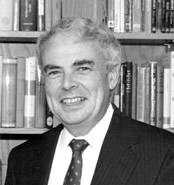
1984-1992
Dr. Farrell was educated at Marquette University and the University of Wisconsin at Madison. He was Associate Vice President for Educational Development and Research at the University of Iowa before coming to Plymouth State. He also served on the faculty of the University of Chicago, the University of California-Berkeley, and Marquette University.
He served as Chancellor of the University System of New Hampshire from 1992-2000 and as President of Rivier College in Manchester from 2001 to 2011, the first male, and the first lay person to serve in that capacity in Rivier’s history.
from Plymouth-Where My Viewpoints Crossed, by Jim Hogan; and advancement publications
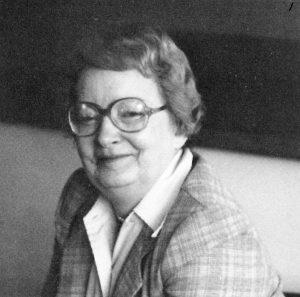
1983-1984
Madie Ward Barrett was a teacher, scholar, and benefactor. She earned her B.A. in French from Alabama College for Women, M.A. and Ph.D. in comparative linguistics from the University of North Carolina at Chapel Hill, with an emphasis in romance linguistics and dialectology. She also studied at the University of Michigan, the Sorbonne in Paris, the Centre d’Etudes in Nice, the Centre Pedagogique in Sevres and Educentro in Madrid. She taught at UNC Greensboro, St. Anselm College, UNH and Bucknell.
At Plymouth she taught French, Spanish, and French literature, trained her students in pedagogy and chaired the Foreign Language Department. She served as Dean of the College from 1981-83 and 1984-85 and was named Professor Emeriti in 1985. She won many prizes and honors and held membership in a number of honorary societies. She was noted for her dedication to students, sense of humor, quiet strength and her sensitivity to the needs of colleagues as she fulfilled her governance role.
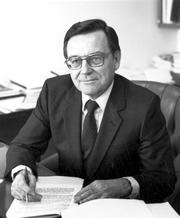
1977-1983
Dr. Kasper Marking was the first male and first layperson to be named president of Briar Cliff College in Iowa in 1972. He was president of Briar Cliff until 1977 when he was appointed President of Plymouth State.
“Dr. Marking saw that campus beautification promised a renewed pride to the students and faculty and the enhancement of the valuable assets that the campus had already developed,” (Where My Viewpoints Crossed. James J. Hogan.) and encouraged its beautification. Marking was also aware of the need for a sense of community at PSU. Representatives of more than 50 colleges and universities attended his inauguration on October 1, 1978. At the inauguration President Marking said, “PSC is purely American, especially in spirit. … These students are from families of ‘working class parents.’ They are student from families that are the salt of the earth.” (Hogan, p. 212.). During his tenure, added attention was given to the human needs of the student population, the Music and Theatre Department was created, the business department expanded, Silver Hall experienced it first renovation, the Society for Scholarly Dialogue was created, the Sidore Lecture Series premiered, and the Plymouth Children’s Center opened Prospect Hall was doubled in capacity. Jim Hogan wrote of Marking , “… [he] encouraged faculty initiative and fostered a spirit of optimism.” (Hogan, p. 223).
President Marking left Plymouth in 1983 to become Chancellor of the University System of New Hampshire.
from Plymouth-Where My Viewpoints Crossed, by Jim Hogan; and advancement publications
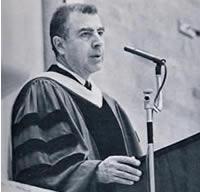
1951-1977
Dr. Hyde was educated at Hartwick College, Albany State College and New York University and received honorary degrees from New England College, St. Anselm College, Hartwick College and Plymouth State College.
He is reported to have made the shortest college commencement address in history. Setting forth three ideals, he said: “‘Know yourself—Socrates. Control yourself—Cicero. Give yourself—Christ." Then he sat down.
Dr. Hyde’s educational career included services as teacher, researcher and administrator in various New York state communities, the state Department of Education in New Hampshire and 26 years as president of Plymouth Teachers College and Plymouth State College.
During his tenure at Plymouth, the college enrollment grew from about 250 to almost 3,500. Buildings added to the campus during that time included a physical education center, a dramatics-music building, a library, a science building, an infirmary, an administration building, a college union, a dining commons, and a multi-purpose classroom building, which bears his name. Also added were five dormitories and two student housing complexes. A scholarship has been created in his honor and the Hyde President’s Award to honor an individual for distinguished educational leadership.
from One Hundred Years of Service: Plymouth State College 1871-1971. Norton R. Bagley; and advancement publications
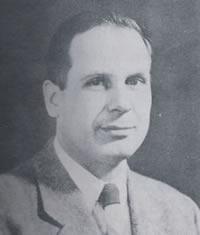
1946-1951
Howard R. Jones served as teacher and guidance counselor in public school in Minneapolis, and taught at the University of Connecticut, Yale University, and the University of New Hampshire. He was superintendent of schools in New Canaan, Ct. before being named president of Plymouth Teachers College.
At Plymouth, Dr. Jones instituted “considerable change in the administration of the school. the college office staff was enlarged; a dean of instruction and a dean of student personnel were added as was a part-time director of public relations. … Dr. Jones also provided leadership in giving the faculty an increased role in the administration and management of the college.” The first graduate program also began during the Jones years.
From Plymouth, he went on to teach educational administration at the University of Michigan and was Dean of the College of Education at the University of Iowa from 1962 to his retirement in 1979. The Howard R. Jones Achievement Award was established by his colleagues and friends at Michigan on his retirement.
from One Hundred Years of Service: Plymouth State College 1871-1971. Norton R. Bagley; and advancement publications
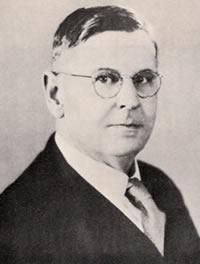
1911-1946
Dr. Silver was educated at Pinkerton Academy in Derry, N.H. and at Dartmouth College. In 1924 he was awarded an honorary Doctor of Pedagogy degree by Dartmouth in honor of his service to education. He served as superintendent of schools in Rochester and Portsmouth New Hampshire and as principal of Pinkerton Academy before coming to Plymouth Normal School (PNS) as principal.
Dr. Silver held the second longest tenure of any Plymouth President, serving for 35 years as principal, director and president of the institution. PNS became Plymouth Teachers College in 1939 in recognition of its increasing stature.
The Commissioner of Education said of Silver, “He possesses in a large degree those rare gifts of tact and educational ability, well versed in the best ideas of modern education.” (Speare, p.15)
After retirement, Silver joined legislature where he introduced bills to grant Master’s degrees at Plymouth Teachers College. The first graduate program was introduced in 1948.
In 1958, the campus voted to name the then music and physical education facility in his honor.
from One Hundred Years of Service: Plymouth State College 1871-1971. Norton R. Bagley; and advancement publications
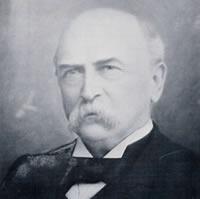
1900-1911
James E. Klock served as president of Plymouth Normal School (PNS) for 11 years. During his tenure, physical education was added to the school curriculum and a student government was instituted. President Klock graduated from the State Normal school at Emporia, Kansas. He was superintendent of schools in Lyon County and principal of Emporia High School (Kansas); superintendent of schools in Leavenworth, Kansas and Helena, Montana before coming to PNS. He later worked in the real estate business in Florida.
from One Hundred Years of Service: Plymouth State College 1871-1971. Norton R. Bagley; and advancement publications
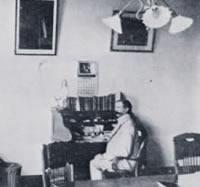
1896-1900
Alfred Hills Campbell is credited with adding a reading room to the library and greatly increasing the library holdings, including magazine and newspaper subscriptions. He also created departments within the school and stressed the importance of hiring degree-holding people.
Campbell was educated at Dartmouth College and the University of Vermont. Before coming to Plymouth he was the associate principal of Cushing Academy (M.A.), principal of Kingston Academy (N.H.), and principal of Johnson Normal School (V.T.). After Plymouth, he was superintendent of schools in South Hadley, M.A.
from One Hundred Years of Service: Plymouth State College 1871-1971. Norton R. Bagley; and advancement publications
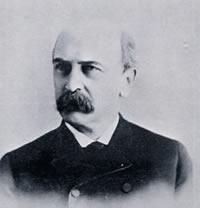
1883-1896
Charles C. Rounds was educated at Dartmouth, Bowdoin and Colby Colleges. He served as principal of public schools in Ohio for six years, and as head of the state normal school in Farmington, Maine from 1868-1883. He retired to New York City, where he died in 1901. Rounds was a founder and president of the National Council of Education, and president of both the New England and National Normal Schools Association. In describing the Plymouth area Rounds wrote, “In scenery, Plymouth is remarkable for the beauty of its meadows, through which the Pemigewasset winds, and for the grace of its Elm trees. Even the hurrying and careless visitor will have his attention arrested here and there by a faultless one, standing out alone over its private area of shadow, seemingly an ever-gushing fountain of graceful verdure.” Rounds Hall, a landmark Plymouth State building that was dedicated in 1891, was named in his honor.
from One Hundred Years of Service: Plymouth State College 1871-1971. Norton R. Bagley; and advancement publications
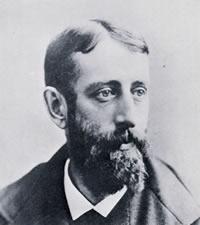
1879-1883
Warren graduated Yale University in 1870 and taught at Merrimack and New Bedford, M.A. He was principal at Dover High School before coming to Plymouth Normal School as principal in 1879. Following his Plymouth years, he was English master at Lawrenceville Institute (N.J.) and principal of the academy at Albany, N.Y.
from One Hundred Years of Service: Plymouth State College 1871-1971. Norton R. Bagley; and advancement publications.
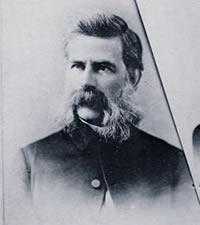
1876-1879
Ambrose P. Kelsey served both as principal for Plymouth Normal School and professor of natural history. He was educated at Hamilton College and Bowdon College. Kelsey served as the first principal of Cincinnatus Academy (N.Y.) in 1857 and professor at the New York State Normal School in Albany in 1859. He went on to Farmington Academy (M.E.) and was influential in establishing Farmington Normal School, the first public institution of higher education in the State of Maine, where he was the first president. He served as principal of Plymouth Normal School from 1876-1879, then moved on to Hamilton College (N.Y.) where he was professor of natural history.
from One Hundred Years of Service: Plymouth State College 1871-1971. Norton R. Bagley; and advancement publications
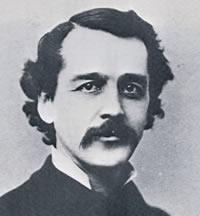
1873-1876
During his short tenure as Principal of Plymouth Normal School, Reverend Ladd saw the school budge expand to fund “four assistants and special instructors in gymnastics, drawing, and instrumental and vocal music. Mr. Ladd emphasized the classical subjects and normal training.” Rev. Ladd was educated at Bowdoin and Yale Divinity School. He served churches in Cromwell, C.T. and Romeo, M.I. and was a professor at Oliver College prior to his appointment as Principal of Plymouth Normal School.
In 1879 he was appointed principal of the Santa Fe Academy which he soon left to help found the University of New Mexico at Santa Fe in 1881. He served as the first and only President of that university. He aided in founding the Ramona Industrial School for Indian Girls of the Southwest. In 1889 he left New Mexico, returning to the East to enter the ministry of the Episcopal Church. He died February 16, 1932 in Massachusetts.
from One Hundred Years of Service: Plymouth State College 1871-1971. Norton R. Bagley; and advancement publications
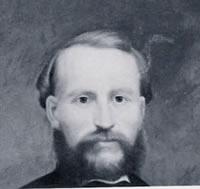
1871-1873
Silas H. Pearl served as the first principal of Plymouth Normal School when it opened its doors to 80 students in 1871. He also served as chief recruiter, public ambassador and the senior of only two faculty members. Born in Albany, Vermont, Pearl married Lydia E. White of Craftsbury; the couple had two daughters.
“Mr. Pearl earned $2,000 per year and his assistant got whatever was left from the school fund at the end of the year. The one teacher earned $133.33 for the fall term.” (Bagley, p. 11).
Pearl is buried in Holderness, N.H., and a medallion in the tradition of his dedication and service to Plymouth State has been created in his name to recognize lifetime service to PSU. His motto is reputed to have been, “Better to wear out than to rust out.” His unfailing sense of duty and the rigors of his responsibilities took a physical toll on him and he died in 1873.
from One Hundred Years of Service: Plymouth State College 1871-1971. Norton R. Bagley; and advancement publications

